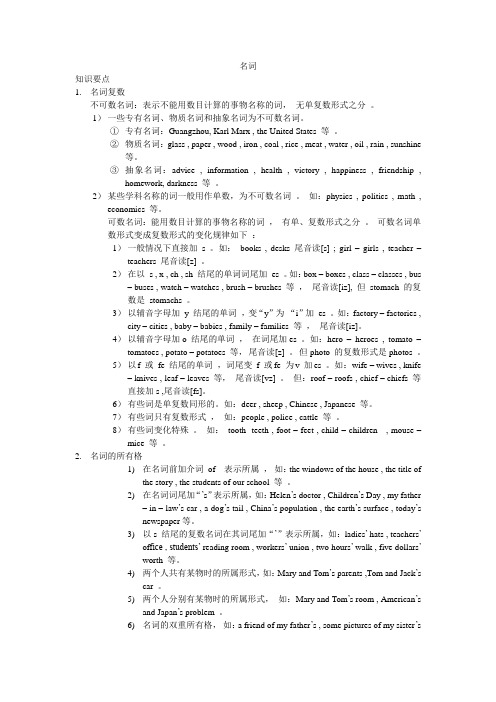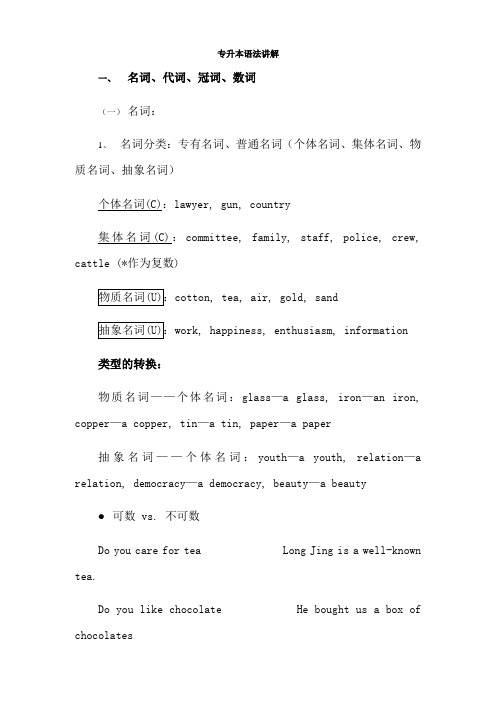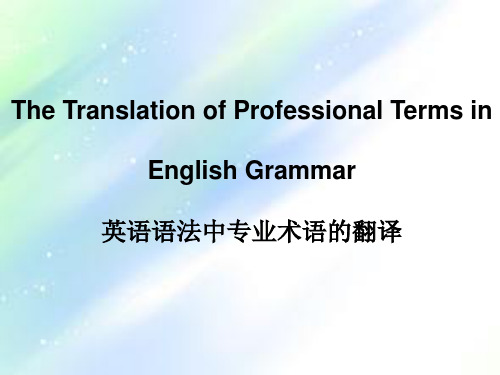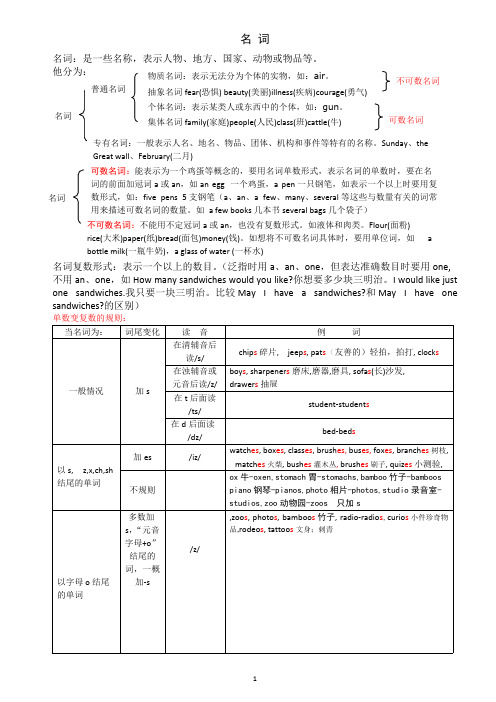英语语法中的专有名词、抽象名词、物质名词
英语语法专业术语

英语语法专业术语结构structure从句clause词组phrase名词noun专有名词proper noun普通名词common noun可数名词countable noun不可数名词uncountable no抽象名词abstract noun具体名词concrete noun物质名词material noun集体名词collective noun个体名词individual noun及物动词transitive verb不及物动词intransitive verb系动词link verb助动词auxiliary verb情态动词modal verb规则动词regular verb不规则动词irregular verb短语动词phrasal verb动词不定式infinitive非谓语动词non-finite verb动名词gerund现在分词present participle使役动词causative verb感官动词verb of senses感叹词exclamation时间状语从句adverbial clause of time地点状语从句adverbial clause of place方式状语从句adverbial clause of manner让步状语从句adverbial clause of concession 原因状语从句adverbial clause of cause结果状语从句adverbial clause of result目的状语从句adverbial clause of purpose条件状语从句adverbial clause of condition 简单句simple sentence并列句compound sentence复合句complex sentence陈述句declarative sentence疑问句interrogative sentence一般疑问句general question特殊疑问句special question 方式副词adverb of manner程度副词adverb of degree时间副词adverb of time地点副词adverb of place修饰性副词adjunct连接性副词conjunct疑问副词interrogative adverb关系副词relative adverb代词pronoun人称代词personal pronoun物主代词possessive pronoun反身代词reflexive pronoun相互代词reciprocal pronoun指示代词demonstrative pronoun疑问代词interrogative pronoun关系代词relative pronoun不定代词indefinite物主代词possessive pronoun名词性物主代词nominal possessive形容词性物主代词adjectival possessivepronoun冠词article定冠词definite article不定冠词indefinite article数词numeral基数词cardinal numeral序数词ordinal numeral分数词fractional numeral形式form单数形式singular form复数形式plural form限定动词finite verb form非限定动词non-finite verb form原形base form从句clause从属句subordinate clause并列句coordinate clause名词从句nominal clause定语从句attributive clause状语从句adverbial clause宾语从句object clause主语从句subject clause主谓关系 subject-predicate relationship选择疑问句alternative question附加疑问句tag question肯定句positive sentence否定句negative sentence祈使句imperative sentence省略句elliptical sentence感叹句exclamatory sentence基本句型basic sentence pattern句子成分members of sentences主语subject谓语predicate宾语object双宾语dual object直接宾语direct object间接宾语indirect object复合宾语complex object补语complement主补subject complement宾补object complement表语predicative定语attributive同位语appositive状语adverbial并列coordinate从属subordination修饰modification前置修饰pre-modification后置修饰post-modification单数形式singular form复数形式plural form规则形式regular form不规则形式irregular form格case普通格common case所有格possessive case主格nominative case宾格objective case时态tense一般现在时present simple tense一般过去时past simple tense一般将来时future simple tense现在进行时present continuous tense 过去进行时past continuous tense现在完成时past perfect tense 过去完成时present perfect tense过去将来时past future tense语态voice主动语态active voice被动语态passive voice语气mood陈述语气indicative mood祈使语气imperative mood虚拟语气subjunctive mood否定negation全部否定full negation局部否定partial negation转移否定shift of negation语序order自然语序natural order倒装语序inversion直接引语direct speech间接引语indirect speech一致agreement主谓一致subject-predicate agreement 语法一致grammatical agreement概念一致notional agreement就近原则principle of proximity强调emphasis重复repetition语音pronunciation语调tone升调rising tone降调falling tone文体style正式文体formal非正式文体informal连字号hyphen祈使句imperative sentences主句indicative mood物质名词material nouns句子的成分members of the sentence 语气mood集体名词collective nouns普通格common case普通名词common nouns比较级comparative degree复合宾语complex Object复合句complex sentences并列复合句compound complex sentences 并列句compound sentences合成词compound words连词conjunction连接副词conjunctive adverbs连接代词conjunctive pronouns转化conversion并列连词co-coordinating conjunctions 可数名词countable nouns陈述句declarative sentences定冠词definite article比较的级别degrees of comparison指示代词demonstrative pronouns派生(词缀法)derivation ( affixation ) 直接宾语direct object直接引语direct speech反意问句disjunctive questions省略ellipsis省略句elliptical sentences感叹号exclamation mark感叹句exclamatory sentences物主代词possessive pronouns抽象名词abstract nouns选择问句alternative questions句子分析analysis of sentences助动词auxiliary verbs过去式past forms过去分词past participle谓语predicate表语predicative前缀prefix(es)介词短语prepositional phrases专有名词proper nouns相互代词reciprocal pronouns不定代词indefinite Pronouns关系副词relative adverbs关系代词relative pronouns自身代词self pronouns虚拟语气subjunctive mood后缀suffix(es)最高级superlative degree句型的转换transformation of sentences动词短语verbal phrases限定词determiner。
英语语法名词

名词知识要点1.名词复数不可数名词:表示不能用数目计算的事物名称的词,无单复数形式之分。
1)一些专有名词、物质名词和抽象名词为不可数名词。
①专有名词:Guangzhou, Karl Marx , the United States 等。
②物质名词:glass , paper , wood , iron , coal , rice , meat , water , oil , rain , sunshine等。
③抽象名词:advice , information , health , victory , happiness , friendship ,homework, darkness 等。
2)某些学科名称的词一般用作单数,为不可数名词。
如:physics , politics , math , economics 等。
可数名词:能用数目计算的事物名称的词,有单、复数形式之分。
可数名词单数形式变成复数形式的变化规律如下:1)一般情况下直接加s 。
如:books , desks 尾音读[s] ; girl –girls , teacher –teachers 尾音读[z] 。
2)在以s , x , ch , sh 结尾的单词词尾加es 。
如:box – boxes , class – classes , bus – buses , watch – watches , brush – brushes 等,尾音读[iz], 但stomach 的复数是stomachs 。
3)以辅音字母加y 结尾的单词,变“y”为“i”加es 。
如:factory – factories , city – cities , baby – babies , family – families 等,尾音读[iz]。
4)以辅音字母加o 结尾的单词,在词尾加es 。
如:hero –heroes , tomato –tomatoes , potato – potatoes 等,尾音读[z] 。
安徽省普通高等学校专升本招生考试主要英语语法复习

专升本语法讲解一、名词、代词、冠词、数词(一)名词:1、名词分类:专有名词、普通名词(个体名词、集体名词、物质名词、抽象名词)个体名词(C):lawyer, gun, country集体名词(C):committee, family, staff, police, crew, cattle (*作为复数)cotton, tea, air, gold, sandwork, happiness, enthusiasm, information 类型的转换:物质名词——个体名词:glass—a glass, iron—an iron, copper—a copper, tin—a tin, paper—a paper抽象名词——个体名词:youth—a youth, relation—a relation, democracy—a democracy, beauty—a beauty 可数 vs. 不可数Do you care for tea Long Jing is a well-known tea.Do you like chocolate He bought us a box of chocolatesHave some coffee. Two coffees, please.●不可数名词的量A piece of news/ advice/ information/ work…A bottle of milk/ ink…2、名词的数:单数、复数特殊的名词复数:●以“O”结尾,不加es的: 末尾为两个元音字母;外来词:radios, bamboos, zoos; photos, pianos, memos, tobaccos●以“f/fe”结尾,直接加es的:Roofs, cliffs, proofs, hoofs, chiefs, gulfs,beliefs●不规则形式:英语中古的复数形式;外来词Man-men, tooth—teeth, child-children, ox-oxenPhenomenon-phenomena, thesis-theses, crisis-crises, criterion-criteria●单复数同形:Chinese, Japanese, aircraft, sheep, deer, fish, swine, means, series, species…●合成名词的复数:只把主体名词改为复数:looker(s)-on, runner(s)-on, son(s)-in-law由man/woman构成的合成名词,全部都变:man-servant—men-servants, woman doctor—women doctors●常以复数形式出现的:两部分构成的;以-ing结尾的;其他Scissors, trousers, glasses, pants…Belongings, surroundings, savings, findings…Statistics, overalls, congratulations, clothes, stairs●以-s为词尾,但做单数看的词:Phonetics, politics, physics3. 名词的格:’s; “of”4. 名词在句中的作用:作主语、宾语、表语、定语、补语等●主语:Complacency is the enemy of study.●表语:We are all servants of the people.●宾语:He knows five languages.●定语:Is it a colour TV●补语:We elected him our monitor.二、代词:人称代词、物主代词、自身代词、相互代词、指示代词、疑问代词、关系代词、连接代词、不定代词1、人称代词、物主代词、自身代词2、相互代词:one another, each otherWe can help one another (each other).3、指示代词:this, that, these, those●指前面提到的事物:that, those (避免重复)The best coal is that from Newcastle.These machines are better than those we turned out last year.●*如果名词是单数可数名词,用the one更多I’ll take the seat next to the one by the window.My room is lighter than the one next door.●指下面要说的事物:this, theseI want to know this: Has John been here●Such: 作定语、主语、表语We have has such a busy day.Such are the results.His illness was not such as to cause anxiety.4. 疑问代词:who, whom, whose, what, which5.关系代词:引起定语从句who, whom, whose, that, which, (such…) as6.连接代词:引起主语从句、宾语从句、表语从句(所有的疑问代词、what)7、不定代词:all, each, every, both, either, neither, one, none, little, few, many, much, other another, some, any, no 及由some, any, no, every构成的合成代词。
英语名词概述1

thank
不可数名词
2.普通名词
物质名词不可数,但表 示具体的东西时,则变 可数,意思也改变:
物质名词: 表示无法分为个体
的实物,如:air, coffee, fire, iron, furniture
集体名词: 表示若干个个体组成
的集合体,如:family ,public, cattle, government, people, police
抽象名 词
difficulty experience failure knowledge
困难 经验 失败 知识
a failure
have a good knowledge of
He is a failure as a doctor. He has a good knowledge of English.
可数名词的复数变化(规则)
Video 1 Video 2 Video 3 Let’s have a summary.
可数名词的复数变化(规则)
情况 一般情况 以s, x, ch, sh结尾的词 加法 加-s 加-es 例词 brothers; schools buses; watches; dishes
以辅音+y结尾的词
以辅音+o 结尾的词 以f或fe结尾的词
去y加-ies
多数加-es 把f/fe改成ves
ladies; countries
heroes; mangoes halves; leaves
其它名词复数的规则变化
1) 以y结尾的专有名词,或元音字母+y 结尾的名词变 复数时,直接加s变复数。例如: monkey---monkeys holiday---holidays 2) 以o 结尾的名词,变复数时: a. 加s,如: photo---photos, piano---pianos b. 加es,如: potato—potatoes tomato--tomatoes c. 上述a和b两种方法均可,如zero---zeros / zeroes
英语语法中的专业术语的翻译

感叹词 interjection 缩写 int.
代词pronoun 缩写pron.
名词 noun 缩写n.
☆普通名词 common noun (集体名词 collective noun/个体名词 individual noun
物质名词 material noun/ 抽象名词 abstract noun ) ☆专有名词 proper noun
☆可数名词 countable noun 不可数名词 uncountable noun
关联词 connective
从句 clause
从属句 subordinate clause
并列句 coordinate clause
☆名词从句 nominal clause
主语从句 subject clause
宾语从句 objective clause
表语从句 predicative clause
同位语从句 oppositive clause
定冠词 definite article 不定冠词 indefinite article
☆数词 numeral 缩写num.
基数词 cardinal numeral 序数词 ordinal numeral
连词 conjunction 缩写 conj.
☆并列连词 coordinating conjunction 从属连词 subordinating conjunction
☆定语从句 attributive clause
英语名词用法大全

Chinese 中国人,sheep 羊,deer 鹿,fish 鱼, Japanese 日本人,li,jin,yuan,two li,three
mu,four jin,但除人民币元、角、分外,美元、英镑、法郎等都有复数形式。如:a dollar, two dollars; a meter, two meters
单数变复数的规则:
当名词为: 词尾变化 读 音
例
词
一般情况
在清辅音后 读/s/
chips 碎片, jeeps, pats(友善的)轻拍,拍打, clocks
在浊辅音或 boys, sharpeners 磨床,磨器,磨具, sofas(长)沙发,
元音后读/z/ drawers 抽屉 加s
在 t 后面读 /ts/
名词
名词:是一些名称,表示人物、地方、国家、动物或物品等。
他分为:
物质名词:表示无法分为个体的实物,如:air。
普通名词
抽象名词 fear(恐惧) beauty(美丽)illness(疾病)courage(勇气)
名词
个体名词:表示某类人或东西中的个体,如:gun。 集体名词 family(家庭)people(人民)class(班)cattle(牛)
German 不是合成词,故复数形式为 Germans;
3、集体名词,以单数形式出现,但实为复数。
2
如: people police cattle 等本身就是复数,不能说 a people,a police,a cattle,但可以说 a person,a policeman,a head of cattle,the English,the British,the French,the Chinese,the Japanese,the Swiss 等名词,表示国民总称时,作复数用。如: The Chinese are industries and brave. 中国人民是勤劳勇敢的。
英语语法名词
少数不规则名词复数变化
有些名词单复数同形 sheep-sheep; fish-fish; deer means手段 Chinese Japanese species种类 series系列 aircraft飞机
• 1. 物质名词
三、 不可数名词量的表示
a. 当物质名词转化为个体名词时。
比较:Cake is a kind of food. 蛋糕是一种食物。 ( 不可数 ) These cakes are sweet. 这些蛋糕很好吃。 ( 可数 ) This factory produces steel. ( 不可数 ) We need various steels. ( 可数 ) Our country is famous for tea. ( 不可数 ) 我国因茶叶而闻名。 Two teas, please. ( 可数 ) 请来两杯茶。
• 例: man-men; woman-women; child-children; foot-feet; tooth-teeth; goose-geese ox-oxen Policeman-policemen Policewoman-policewomen Englishman-Englishmen gentleman-gentlemen 注意:German-Germans
四、 定语名词的复数
• 名词作定语一般用单数,但也有以下例外。 1. 用复数作定语。 如: sports meeting 运动会 students reading-room 学生阅览室 talks table 谈判桌 the foreign languages department外语系 2. man, woman, gentleman 等作定语时,其单复 数以所修饰的名词的单复数而定。 如: men workers, women teachers, gentlemen officials
英语语法名词
people trousers
clothes
shoes
glasses
这些名词作主语时,注意它们的谓语用 复数 * My clothes are newer than yours.
3.可数名词可以被a, an, one, two以及 how many,many,a few,few,any, lots of, a lot of , some等修饰
★6. 名词做主语时,应注意名词的数,避免主 谓不一致。 * Her family is a large one and her family are all teachers. 她家是一个大家庭,她的家人都是老师。
重难点突破 5. Where is Tom? ---He has gone to the _____. D
* Children’ s Day * men’ s shoes
4.无生命名词的所有关系用of加名词, 构成所属关系的短语
*the color of the wall *a picture of the classroom
1. June 1st is ____Day. All the Children enjoy it C very much. A. Children B. Childrens’ C. Children’s D. Child C 2. The two bedroom are the ____. A. twins B. twin’s C .twins’ D. twins
名词单数的表达 一般可用a,an,one来修饰 注:a用于辅音音素开头的单词前,an用 于元音音素开头的单词前
*a book * an English book * an hour
找规律,总结规则
英语名词的种类
英语名词的种类一、按意义分类1.专有名词表示具体的人,事物,地点,团体或机构的专有名称(第一个字母要大写)。
例:China(中国)、Asia(亚洲)、Beijing(北京)。
2.普通名词表示某些人,某类事物,某种物质或抽象概念的名称。
例如:teacher老师、tea茶、reform改革。
普通名词又可进一步分为五类:(1)个体名词(Individual Nouns):表示单个的人和事物。
如car (汽车)、room(房间)、fan(风扇)、photo(照片)(2)集体名词(Collective Nouns):表示一群人或一些事物的名称。
如people(人们)、family(家庭)、army(军队)、government (政府)、group(集团)(3)复合名词(Compound Nouns):两个或两个以上名词连在一起构成的名词。
如passerby(过路人)、brother-in-law(内兄)(4)物质名词(Material Nouns):表示物质或不具备确定形状和大小的个体的物质。
如fire(火)、steel(钢)、air (空气)、water (水)、milk(牛奶)(5)抽象名词(Abstract Nouns):表示动作,状态,品质或其他抽象概念。
如labor(劳动)、health(健康)、life (生活)、friendship(友情)、patience(耐力)二、按是否可数分类1. 不可数名词不可数名词是指不能以数目来计算,不可以分成个体的概念、状态、品质、感情或表示物质材料的东西;它一般没有复数形式,只有单数形式,它的前面不能用不定冠词a / an。
抽象名词,物质名词和专有名词一般是不可数名词。
如milk(牛奶),bread(面包),coffee (咖啡)等。
2. 可数名词可数名词是指能以数目来计算,可以分成个体的人或东西,因此它有复数形式。
如cup(杯子),cat(猫)等。
英语语法名词
1). 表示时间,如: today`s newspaper今天的报纸, two days` work 两天的工作
2). 表示度量衡及价值 a mile`s distance 一英里的距离,ten dollars` value 10美元的价值
I saw the boy .我看到那个男孩。(boy 作动词saw的宾语) Give the money to your brother. 把这些钱给你兄弟。(brother 作介词to的宾语)
3. 表语 He is a clever boy. 他是个聪明的孩子。
4. 宾语补足语 They called him a fool. 他们叫他傻瓜。
1)一般加-s
如:map------maps地图 field------fields田地
2)以s, x, sh, ch 结尾的名词后加-es
如:class---classes班,box---boxes盒子 dish---dishes盘子, match---matches比赛
如: John`s father 约翰的父亲, spiders` web 蜘蛛网
2. 名词所有格的构成
1)一般直接加" ` ",
如: this child`s book这个小孩的书, children`s books儿童书籍
2)加了-s 或-es 的复数名词后,只加" ` ",
如:work工作,honesty诚实,courage勇气
名词按其可数性分为可数名词(countable nouns)和不可数名词(uncountable nouns)。类名词皆可数,集体名词大都可数,专有名词、物质名词和抽象名词多不可数。
- 1、下载文档前请自行甄别文档内容的完整性,平台不提供额外的编辑、内容补充、找答案等附加服务。
- 2、"仅部分预览"的文档,不可在线预览部分如存在完整性等问题,可反馈申请退款(可完整预览的文档不适用该条件!)。
- 3、如文档侵犯您的权益,请联系客服反馈,我们会尽快为您处理(人工客服工作时间:9:00-18:30)。
抽象名词
不可数名词是因不能数而无单复数之分的名词,一般可用no, any, some, a little, much 等修饰,如food(食物),news(新闻),fruit(水果),bread(面包),hunger(饥饿),truth(真相)等。
There is some food on the table.
桌上有一些食物。
There is much news in the newspaper.
报纸上有大量新闻。
You can eat any fruit on the table.
你可以吃桌上的任何水果。
A little bread is left in the basket.
筐里剩下一点面包。
They feel no hunger now.
他们不感到饿了。
不可数名词包括物质名词、抽象名词和专有名词。
抽象名词是动作、性质、概念、状态等的名称,如:washing(洗衣),kindness(仁慈),time(时间),friendship(友谊),hope(希望)等。
Mother is doing some washing.
妈妈正在洗衣服。
表动作:washing 洗衣
Mother is much moved by his kindness.
妈妈被他的仁慈深深打动。
表性质:kindness 仁慈
It's time to go to bed, boy!
孩子,睡觉的时间到了!
表概念:time 时间
Our friendship is everlasting.
我们的友谊地久天长。
表概念:friendship 友谊
1. 抽象名词一般无复数形式,不加冠词,只有特指时加the。
The friendship between us is long and lasting.
我们的友谊地久天长。
friendship是特指的。
2. 有些抽象名词可与of连用,起形容词的作用。
Your gift is of great value.
你礼物的价值很大。
相当于It is very valuable。
专有名词
1. 专有名词是指人、地方、称谓、机构、语言、国民、周日、月份、节日等的专有名称,第一个字母要大写,一般无复数形式,前面一般不加冠词。
December 25 is Christmas Day.
十二月二十五日是圣诞节。
My name is Peter and I am a Chinese.
我叫彼得,我是中国人。
I graduated from Harvard University and I work in a company on Wall Street.
我毕业于哈佛大学,在华尔街一家公司供职。
Can you speak English?
你会讲英语吗?
2. 有些专有名词,或在某种情形时的专有名词依然要有冠词。
比如Chinese, English等国语名称之后有language时,前面用定冠词the。
比较下面两句?
Can you speak Chinese?
你会讲中文吗?
No. The Chinese language is hard to learn.
不会。
中国话很难学。
3. 不定冠词a/an放在姓名之前表示与某名人类似的人。
I wish to become an Einstein.
我希望成为像爱因斯坦那样的人。
4. 专有名词用作单数普通名词。
Peter is very clever; perhaps he will be another Einstein.
彼得非常聪明,他将来可能成为另一位爱因斯坦。
5. 有些专有名词可用作复数普通名词,字尾要加-s或-es。
I always get up late on Saturdays. 星期六我总是起床晚
1. 物质名词是材料、食品、饮料以及固体、液体和气体的物质名称。
Do you have bread?
你们有面包吗?
Do you have milk?
你们有牛奶吗?
Do you have sugar?
你们有食糖吗?
Do you have cooking oil?
你这儿有食用油吗?
Do you have cloth?
你这儿有布料吗?
以上的句子中的bread, milk, sugar, oil, cloth都是物质名词。
2. 物质名词一般没有复数形式;表示物质名词的数量时,前面需加表示计量的名词。
We want two breads. ?
我们想要两个面包。
We want three milks. ?
我们想要三个牛奶。
We want a sugar. ?
我们想要一个食糖。
We also want two oils. ?
我们还想要两个食用油。
Mom, can we have three cloths, too? ?
妈妈,我们还可以再来三个布料吗?
应该这样说:
We want two pieces of bread. 我们想要两块面包。
three boxes of milk
三盒牛奶
one bag of sugar
一袋食糖
two barrels of cooking oil 两桶食用油
three pieces of cloth.
三块布料
.。
